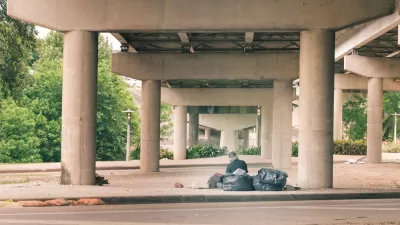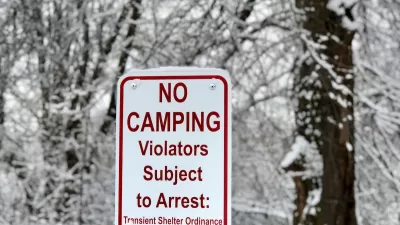An annual reports finds a growing number of homelessness in Utah. That information, coupled with mistakes in earlier reports, casts doubt on the state's record of success in housing vulnerable populations.

"Once lauded as a leader among U.S. cities struggling to relieve homelessness, the number of people sleeping rough in Utah's capital has spiked in the past two years, as funding for its groundbreaking housing programme dried up," reports Gregory Scruggs.
According to the 2015 "Comprehensive Report on Homelessness" [2015] by the Utah Department of Workforce Services, chronic homelessness reduced 91 percent in the state the first half of the decade. That story quickly changed, however. The "2018 report [pdf] said that the number of people sleeping outdoors in the state has nearly doubled since 2016," according to Scuggs.
Utah's earlier track record of success was credited for many years to the "Housing First" policy adopted by the state in 2005. That program, "focused on getting people into housing, regardless of mental illness or substance abuse problems that could be treated after accommodation was secured," explains Scruggs.
Glenn Bailey, who directs Crossroads Urban Center, a Salt Lake City food pantry, is quoted in the article saying Utah's homeless numbers started rising when it stopped funding the program.
But there's also reason to believe that the Housing First program was never as successful as the 2015 homelessness report claimed. Tania Dean reported in December 2018 on an audit from the Office of the Legislative Auditor General: "According to the audit, between state, federal and private donations, $100 million was spent on solving Utah’s homeless issue in 2017. However, auditors don’t know if any of the homeless services provided to decrease the state’s homeless population have been working."
The audit blames "problems with the data and weak management information systems" for the errors in the 2015 report.
Hat tip to YIMBY Wiki for sharing the news about the audit.
FULL STORY: Once a national model, Utah struggles with homelessness

Maui's Vacation Rental Debate Turns Ugly
Verbal attacks, misinformation campaigns and fistfights plague a high-stakes debate to convert thousands of vacation rentals into long-term housing.

Planetizen Federal Action Tracker
A weekly monitor of how Trump’s orders and actions are impacting planners and planning in America.

In Urban Planning, AI Prompting Could be the New Design Thinking
Creativity has long been key to great urban design. What if we see AI as our new creative partner?

King County Supportive Housing Program Offers Hope for Unhoused Residents
The county is taking a ‘Housing First’ approach that prioritizes getting people into housing, then offering wraparound supportive services.

Researchers Use AI to Get Clearer Picture of US Housing
Analysts are using artificial intelligence to supercharge their research by allowing them to comb through data faster. Though these AI tools can be error prone, they save time and housing researchers are optimistic about the future.

Making Shared Micromobility More Inclusive
Cities and shared mobility system operators can do more to include people with disabilities in planning and operations, per a new report.
Urban Design for Planners 1: Software Tools
This six-course series explores essential urban design concepts using open source software and equips planners with the tools they need to participate fully in the urban design process.
Planning for Universal Design
Learn the tools for implementing Universal Design in planning regulations.
planning NEXT
Appalachian Highlands Housing Partners
Mpact (founded as Rail~Volution)
City of Camden Redevelopment Agency
City of Astoria
City of Portland
City of Laramie





























